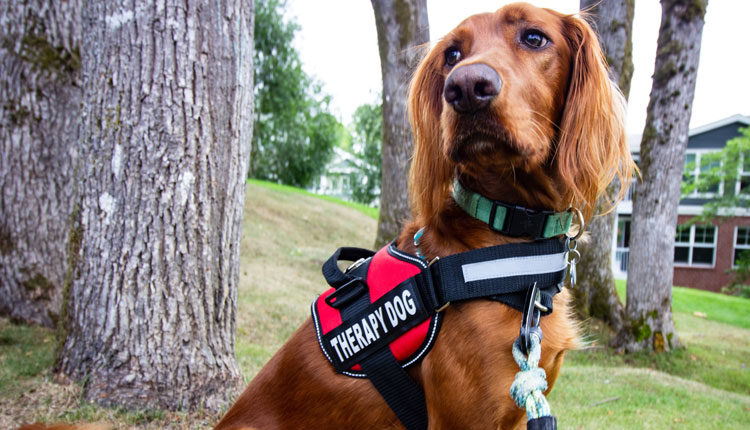The Benefits of Therapy and Service Dogs for Autism
Past studies have proven that dogs work as social catalysts by encouraging people to bond with each other. Research has also found this to be evident in individuals with autism, including a review in the Journal of Alternative and Complementary Medicine concluding that therapy dogs play a critical role in helping autistic individuals become more vocally and socially engaged.
Another study measured the salivary levels of cortisol (a stress hormone) in 42 children with autism at three different times: before and during the introduction of a service dog into their family and after a short period during which the dog was removed from the family. Researchers concluded that “the introduction of service dogs translated into reducing cortisol levels and the number of disruptive behavioral incidents in children with ASD.”
For these reasons, dogs are highly recommended for autistic individuals not just for their companionship, but for the therapeutic benefits as well. However, obtaining the right dog can be a daunting task and understanding the differences between the types of dogs is crucial. These include: therapy dogs, service dogs and emotional support dogs. Here are some distinctions to consider when deciding which type of dog is right for someone with autism:
Service Dog – service dogs undergo comprehensive training and official certification to help with the specific needs of their owners, which can include vision impairment, seizures, mobility and other medical issues. The Americans with Disabilities Act (ADA) mandates that these dogs can go into places where animals are forbidden including restaurants, stores and other public locations. They are also allowed in housing, even if other pets are not permitted. Because of the specialized training, obtaining a service dog involves an often lengthy and expensive process with costs ranging from $15,000 to $50,000. However, there are organizations out there that can provide assistance finding and affording a service dog for those in need.
Therapy Dog – while often used as a medical treatment plan for many conditions including autism, therapy dogs are not considered service dogs under the ADA and don’t have the same legal rights to access public spaces. They can be trained to be comfortable in new environments and assist with calming their owners in stressful situations and helping to promote social interactions. These dogs can receive a special AKC Therapy Dog title by becoming certified through a recognized therapy dog organization.
Emotional Support Dog – similar to therapy dogs, emotional support dogs do not meet the criteria for a service dog under the ADA. However, the Fair Housing Act mandates “reasonable accommodations” for emotional support dogs even in places that don’t allow pets. Airlines are also required to allow them on flights, but travelers must provide documentation from a doctor or licensed therapist. They can be trained for a specific owner, but unlike service dogs, are not trained for tasks related to a person’s specific disability. They provide companionship and can ease anxiety, depression, phobias and loneliness. An emotional support dog must be prescribed by a mental health professional for someone with a diagnosed psychological or emotional disorder such as PTSD, anxiety, major depression or panic attacks.
An example of a service dog for autism is Helper Dog Nala, who along with her owner, have become frequent guests at Disney World in Orlando. With over 64,000 followers on Instagram, Nala has become an Internet sensation for her calming and lovable demeanor towards those she comes in contact with:
Whether you are considering a service dog, therapy dog or emotional support dog, finding an appropriate match can be a challenging process, with waiting and training periods taking up to two years to complete. However, with a little bit of patience and tapping the right organizations for assistance, the end result will be an extremely rewarding and therapeutic endeavor for those with autism and their loved ones.
# # #
RESOURCES
4 Paws For Ability
Alliance of Therapy Dogs
AKC Recognized Therapy Dog Organizations

